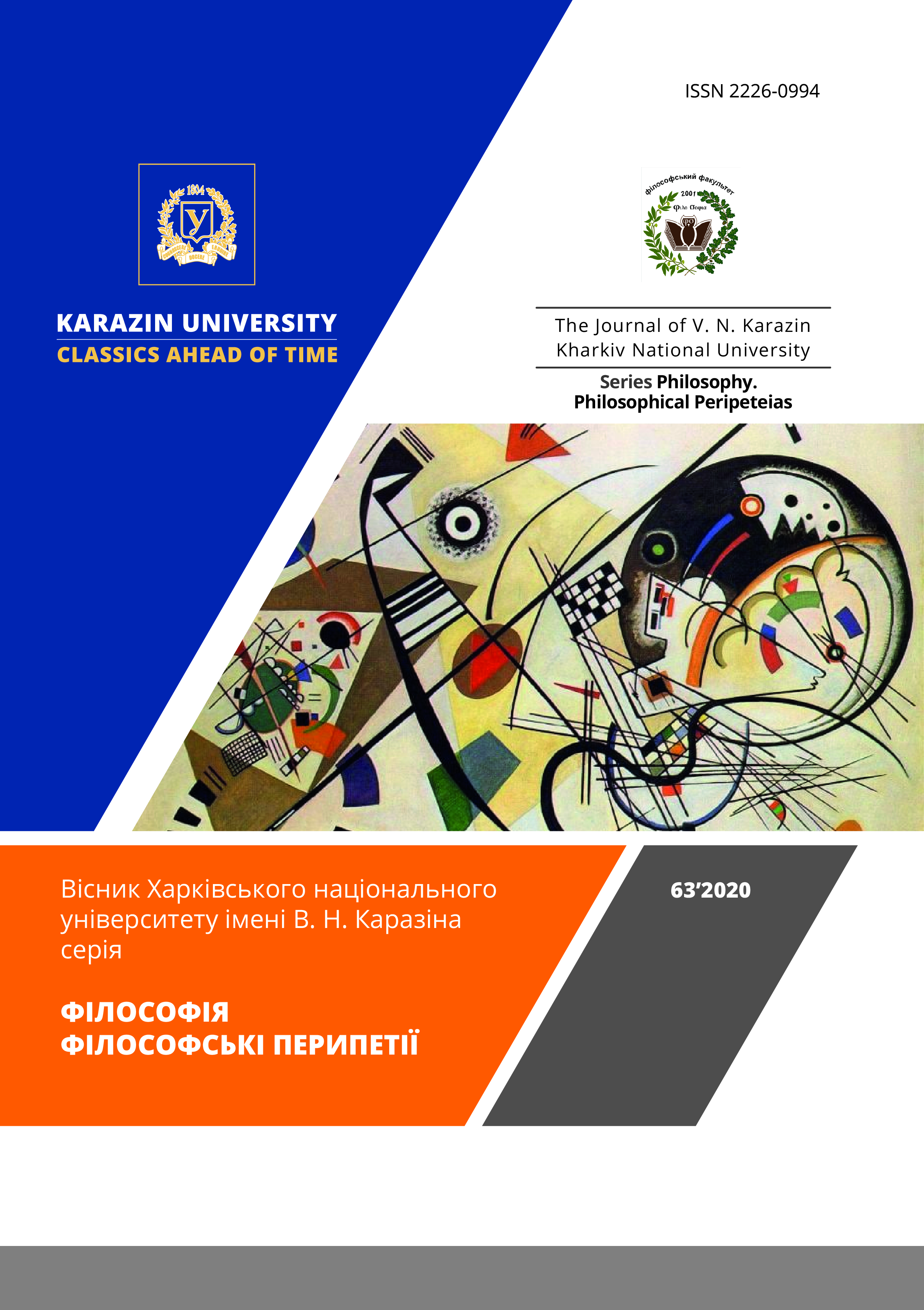ISSUE OF GERMAN GUILT IN THE PHILOSOPHY OF KARL JASPERS
Abstract
The main research aspect of the article is the “issue of guilt”, i. e. Germany’s responsibility for the establishment of Nazism and the outbreak of World War II in the philosophical legacy of the German existentialist philosopher Karl Jaspers. The article analyzes the ideas of K. Jaspers on the need to realize and admit guilt for their crimes by the German people and to overcome the totalitarian legacy. K. Jaspers emphasizes that the German people must be held accountable for the crimes of the Nazi regime in the 1930s and 1940s. Jaspers addresses the issue of morality and identifies four types of guilt. The first type is criminal guilt, which lies on those who have committed criminal offenses. The second type is political guilt. The third type is moral guilt. The last, fourth type is metaphysical guilt which is associated with a sense of responsibility for every wrong and unjust act in the world. For the author, the last two types of guilt are of the greatest importance. Thus, the tragedy of World War II and the ethnic genocides committed by the Nazis were the result of moral and ethical problems and the general spiritual crisis of the German people. The key role is given to the metaphysical aspect of this crisis. It is claimed that it was the spiritual problems that gave rise to the irreversible processes in the development of the entire nation. The paramount importance of the phenomenon of collective thinking is denied, giving preference to the personal level. It is noted that the main condition for spiritual revival is the rejection of national illusions, an unbiased view of one’s own past and present life, the recognition of one’s own sin, without which repentance of both the nation and the individual is impossible. Of great importance is the aspect of humility, which functions as “our spiritual essence”, which leads to the fact that man is on the path of perfection, which ultimately leads him to God. It is emphasized that the admission of guilt and remorse is a vital necessity for the German people. The article also highlights the impact of Jaspers’ ideas on the formation of modern humanitarian policy in the Federal Republic of Germany.
Downloads
References
/References
Adorno, T. (2012). The Authoritarian Personality. (M. Popov, Trans.). Moscow: AST. (Original work published 1950). (In Russian).
Arendt, H. (1996). The Origins of Totalitarianism. (L. Sedova, Trans.). Moscow: CentrCom. (Original work published 1951). (In Russian).
Arendt, H. (2008). Eichmann in Jerusalem: A Report on the Banality of Evil. (S. Kastalskii & N. Rudnytskaia, Trans.). Moscow: Europe. (Original work published 1963). (In Russian).
Fromm, E. (2009). Escape from Freedom. (А. Laktionov, Trans.) Moscow: AST. (Original work published 1941). (In Russian).
Frumkina, R. (2007). Guilty Without Guilt: Karl Jaspers on the Historical Guilt of the German People. Scientific Journal of Humanitarian Studies, 1, 93–97. (In Russian).
Hayek, F. А. (2010). The Road to Serfdom. (M. Gnesdovskiy, Trans.). Moscow: AST. (Original work published 1944). (In Russian).
Jaspers, K. (1999). The Issue of Guilt. Germany’s Political Responsibility. (S. Apt, Trans.) Moscow: Progress. (Original work published 1946). (In Russian).
Jaspers, K. (2013). The Spiritual Situation of the Age. (M. Levina, Trans.) Moscow: AST. (Original work published 1932). (In Russian).
Snyder, T. (2015). Bloodlands: Europe Between Hitler and Stalin. (L. Zurnadjy, Trans.). Kyiv: Duliby. (Original work published 2010). (In Russian).
Žižek, S. (1999). The Sublime Object of Ideology. (V. Sofronov, Trans.). Moscow: Khudozhestvennyi Zhurnal. (Original work published 1989). (In Russian).
Адорно Т. Исследование авторитарной личности / пер. с нем. М. Попов, М. Кондратенко. М.: АСТ, 2012. 480 с.
Арендт Х. Банальность зла. Эйхман в Иерусалиме / пер. с англ. С. Кастальский, Н. Рудницкая. М.: Европа, 2008. 424 с.
Арендт Х. Истоки тоталитаризма / пер. с англ. Л. Седов. М.: ЦентрКом, 1996. 704 с.
Жижек С. Возвышенный объект идеологии / пер. с англ. В. Софронов. М.: Художественный журнал, 1999. 234 с.
Снайдер Т. Кровавые земли: Европа между Гитлером та Сталиным / пер. с англ. Л. Зурнаджи. К.: Дуліби, 2015. 448 с.
Фромм Э. Бегство от свободы / пер. с нем. А. Лактионова. М.: АСТ, 2009. 220 с.
Фрумкина Р. Без вины виноватые: Карл Ясперс об исторической вине немецкого народа. Научный журнал гуманитарных студий. 2007. № 1. С. 93–97.
Хайек Ф. Дорога к рабству / пер. с англ. М. Гнедовского. М.: АСТ, 2010. 320 с.
Ясперс К. Вопрос о виновности. О политической ответственности Германии / пер. с нем. С. Апта. М.: Прогресс, 1999. 148 с.
Ясперс К. Духовная ситуация времени / пер. с нем. М. Левиной. М.: АСТ, 2013. 288 с.
Kirkbright S. Karl Jaspers: A Biography: Navigations in Truth. New Haven: Yale University Press, 2004. 244 p.
Stewart A. Theories of Power and Domination: The Politics of Empowerment in Late Modernity. California: SAGA, 2001. 270 p.
Thornhill C. Karl Jaspers: Politics and Metaphysics. London: Routledge, 2002. 288 p.

This work is licensed under a Creative Commons Attribution 4.0 International License.
Authors who publish with this journal agree to the following terms:
- Authors retain copyright and grant the journal right of first publication of this work under the terms of a license Creative Commons Attribution License 4.0 International (CC BY 4.0).
- Authors are able to enter into separate, additional contractual arrangements for the non-exclusive distribution of the journal's published version of the work (e.g., post it to an institutional repository or publish it in a book), with an acknowledgement of its initial publication in this journal.
- Authors are permitted and encouraged to post their work online (e.g., in institutional repositories or on their website) prior to and during the submission process, as it can lead to productive exchanges, as well as earlier and greater citation of published work.






3.gif)




